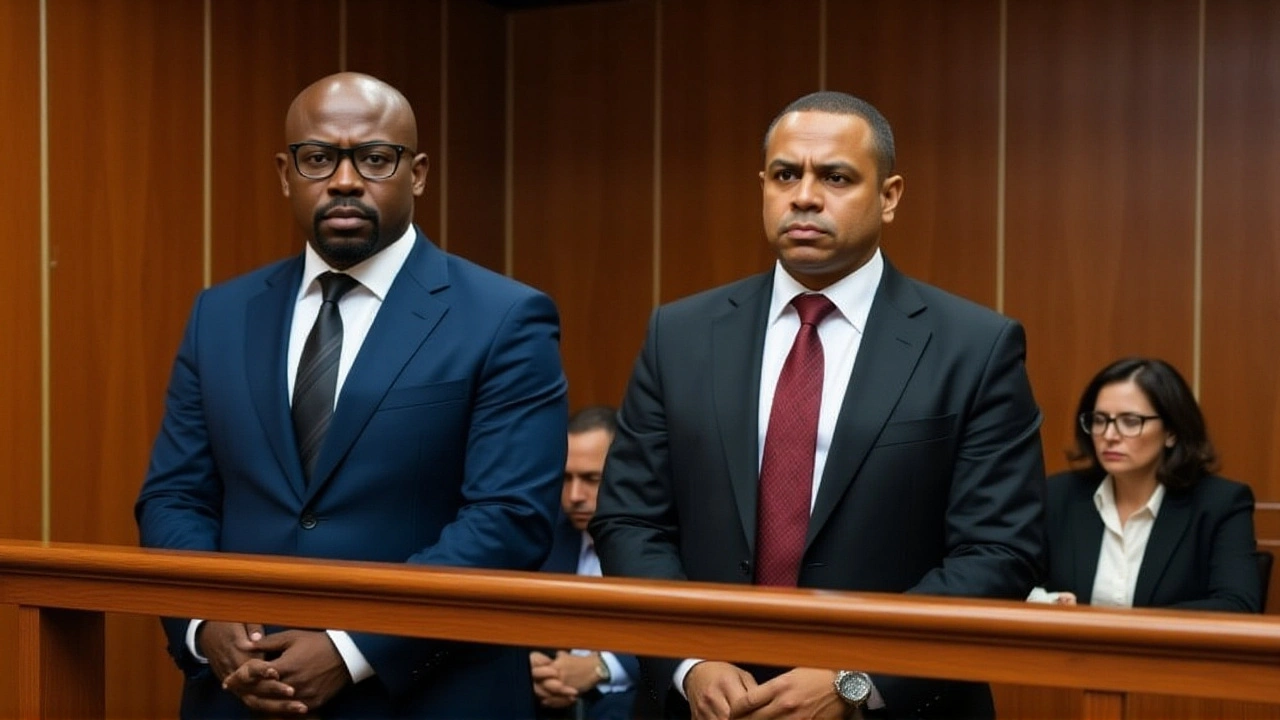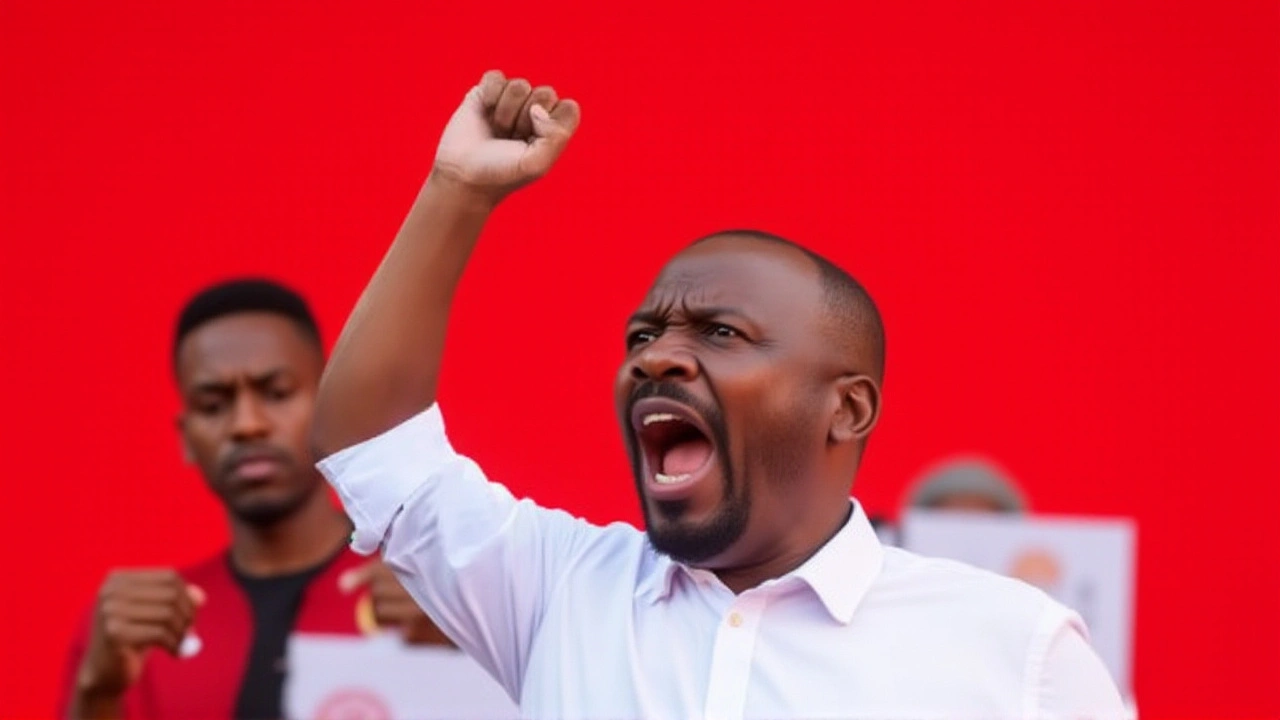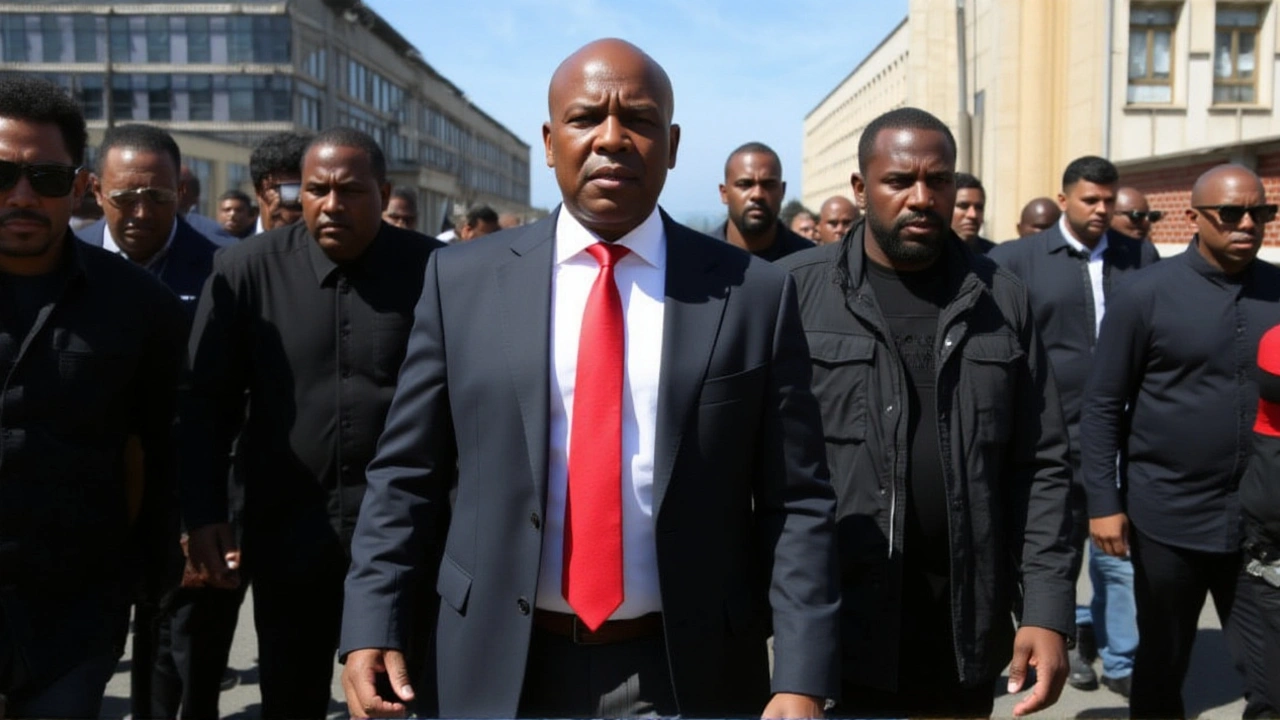When Julius Malema, leader of Economic Freedom Fighters, was handed a guilty verdict on 1 October 2025, South Africa’s political theatre shifted dramatically.
The court in Johannesburg found him guilty of five serious offenses – illegal possession of a firearm, unlawful discharge of a weapon in public, reckless endangerment and two related charges – after an EFF rally where he allegedly fired between 14 and 15 live rounds from an assault rifle onto a stage packed with roughly 20,000 supporters.
Historical backdrop: a litany of legal battles
Malema’s run‑ins with the law stretch back over a decade. In March 2010, he was convicted of hate speech for deriding former President Jacob Zuma’s rape accuser. A 2012 fraud, money‑laundering and racketeering case fizzled out in 2015 after endless delays by the National Prosecuting Authority. Most recently, a 2025 hate‑speech conviction labeled his 2022 remarks as an incitement to kill “racists,” and he is already appealing that decision.
What makes the October ruling distinctive isn’t just the severity of the charges but what the South African Constitution demands when a parliamentarian lands a custodial sentence exceeding twelve months.
Details of the October conviction
The prosecution presented video footage showing a rifle discharging live ammunition onstage, eyewitness accounts of panic among the crowd, and forensic analysis confirming the rounds matched those recovered at the scene. The defense argued the gun was a prop that mis‑fired, but the judge rejected that explanation, noting the clear intent to fire live fire in a densely packed venue.
Judge Thabo Mokoena sentenced Malema to a minimum of 15 years, pending a pre‑sentencing hearing slated for January 2026. The sentencing guidelines also trigger an automatic disqualification from the National Assembly, a provision enshrined in the Constitution of South Africa.
Reactions from the political arena
“The law is clear: if Malema receives a custodial sentence exceeding 12 months, he would lose his position in parliament,” explained political analyst Seepe Mthembu, who appeared on the Sunday Times panel. His assessment echoed that of the EFF’s legal team, which nevertheless claimed the case was shaped by external pressure, pointing to statements from the United States that “the use of firearms in public gatherings is unacceptable.”
The United States reference sparked a diplomatic ripple, with the South African Department of International Relations denying any interference and reaffirming the independence of the judiciary.

Legal implications under the Constitution
Section 47 of the Constitution stipulates that any person sentenced to more than twelve months in prison is ineligible to serve as a Member of Parliament. Since Malema’s minimum term far exceeds that threshold, the moment a final custodial sentence is confirmed, his parliamentary seat will be declared vacant.
Legal scholar Dr. Lindiwe Khumalo from the University of Cape Town noted, “This isn’t just a personal setback for the EFF leader; it sets a precedent for how serious criminal conduct by elected officials is handled.”
Potential political fallout for the EFF
The Economic Freedom Fighters, founded in 2013 with Malema at the helm, have risen to become the third‑largest party in the National Assembly. Their support base is heavily concentrated in the townships of Gauteng, KwaZulu‑Natal and the Eastern Cape. Recent polls by Afrobarometer showed the EFF at 13.2 % of the vote, a modest dip from its 14.6 % peak in the 2019 election.
If Malema is removed from parliament, the party will need to appoint an interim leader. Deputy leader Mokgoro hinted at a “smooth transition,” but insiders say internal factions are already jostling for influence.
What’s next: appeals and the broader picture
Malema’s legal team has filed an appeal with the Supreme Court of Appeal, arguing procedural irregularities and claiming the evidence was mishandled. The appeal is expected to be heard no earlier than June 2026.
Meanwhile, the pre‑sentencing hearing in January will determine the exact length of the custodial term and whether any portion of the sentence might be suspended. Should the court decide on a sentence under twelve months – an unlikely scenario given the gravity of the offenses – Malema could technically retain his seat, though political pressure would remain intense.
Regardless of the outcome, this episode could reshape South Africa’s discourse on political violence, gun control and accountability. Observers abroad are watching to see whether the country’s institutions can uphold the rule of law in a hyper‑polarised environment.

Frequently Asked Questions
How does the conviction affect the Economic Freedom Fighters?
If the final sentence exceeds twelve months, Malema will lose his parliamentary seat, forcing the EFF to appoint a new leader in the National Assembly. That could trigger internal power struggles and potentially dent the party’s poll numbers, which were already sliding to 13.2 % in the latest Afrobarometer survey.
What legal avenue does Malema have after the conviction?
His team has lodged an appeal with the Supreme Court of Appeal, arguing procedural flaws and mishandling of evidence. A hearing is expected in mid‑2026, and the appeal could overturn or reduce the convictions, though the pre‑sentencing hearing in January will still set a baseline term.
Why is the United States mentioned in relation to the case?
Some EFF spokespeople suggested that U.S. criticism of public firearm use may have influenced the prosecution’s vigor. South African officials, however, dismissed any foreign meddling, emphasizing that the judiciary acted independently based on the evidence presented.
What precedent does this set for other South African politicians?
The case reinforces the constitutional rule that any elected official sentenced to more than a year in prison automatically loses their seat. It signals that serious criminal conduct will trigger tangible political consequences, potentially deterring future misuse of power.
When will the final decision on Malema’s parliamentary status be made?
The definitive answer hinges on the pre‑sentencing hearing scheduled for January 2026. If the court announces a custodial term longer than twelve months, the constitutional ban on his parliamentary participation will take effect immediately thereafter.


Jordyn Wade
October 3, 2025 AT 07:30Julius Malema’s conviction marks a watershed moment in South African politics. It demonstrates that even the most powerful figures can be held accountable under the rule of law. The courtroom evidence left little doubt about the seriousness of the offenses. Video footage clearly captured live rounds being discharged into a densely packed crowd. Witnesses described a wave of panic that rippled through the rally. Forensic analysis matched the ammunition to those recovered on site. The judge’s rejection of the “prop gun” defense underscored the gravity of the act. By imposing a minimum fifteen‑year term the court sent a strong message about public safety. The constitutional provision that bars parliamentarians sentenced to over twelve months from serving further reinforces democratic safeguards. This case will likely reverberate through the Economic Freedom Fighters’ internal dynamics. Deputy leader Mokgoro’s promise of a smooth transition may be tested by factional jockeying. Polls already indicate a modest dip in the party’s support. The upcoming appeal to the Supreme Court of Appeal could extend the legal saga into 2026. Meanwhile the pre‑sentencing hearing in January will determine the exact length of the custodial term. Observers abroad are watching closely to see whether South Africa’s institutions can maintain independence in a polarized climate. The outcome may set a precedent for how other elected officials are treated when they cross the line.
Zoe Birnbaum
October 9, 2025 AT 02:23It’s encouraging to see the judiciary taking such decisive action against public violence. The clear evidence leaves little room for speculation about intent. By upholding the constitutional ban, the courts reinforce the principle that no one is above the law. This should serve as a deterrent for future leaders tempted to resort to force. The political arena will have to adapt to a new reality where accountability is paramount.
manoj jadhav
October 14, 2025 AT 21:16Indeed, the trial, which unfolded over several weeks, presented a complex tapestry of testimonies, forensic reports, and video evidence, all pointing toward a deliberate act, and yet the defense, invoking the notion of a “prop gun,” struggled to find footing, thereby underscoring the challenges faced by the prosecution in navigating procedural intricacies, while the public, understandably, awaited a verdict that would address the widespread concerns about safety at political gatherings.
saurav kumar
October 20, 2025 AT 16:10The conviction shows that gun violence has consequences, even for politicians.
Ashish Kumar
October 26, 2025 AT 10:03In a striking display of judicial resolve, the court has delivered a verdict that reverberates far beyond the walls of the courtroom, casting a long shadow over the political landscape and signaling that the age of impunity for elected officials is drawing to a definitive close.
Pinki Bhatia
November 1, 2025 AT 04:56It is indeed a sobering development, and it highlights the need for all parties to respect legal boundaries while pursuing their agendas. The emphasis on due process should guide future political discourse.
NARESH KUMAR
November 6, 2025 AT 23:50Wow, what a turn of events! 🚨 The legal system really stepped up. 🔍 Let’s hope this brings some calm to the streets. 🙏
Prince Fajardo
November 12, 2025 AT 18:43Oh great, just what the nation needed – another headline about “accountability” while the same old power plays continue behind the scenes.
Subhashree Das
November 18, 2025 AT 13:36The narrative that this case will dramatically shift politics is overblown. History shows that parties adapt and survive, regardless of individual setbacks.
jitendra vishwakarma
November 24, 2025 AT 08:30Ths coneviction shoudl rattle the EFF but they will probabily nd a way to keep their base rallied.
Shashikiran R
November 30, 2025 AT 03:23This sarcasm merely masks the reality that leaders who endanger lives must face the full force of the law, not be dismissed with flippant jokes.
SURAJ ASHISH
December 5, 2025 AT 22:16The sentencing sends a clear message that violence has legal limits.
PARVINDER DHILLON
December 11, 2025 AT 17:10Everyone should take note – justice is being served 🙌🏽.
Amber Brewer
December 17, 2025 AT 12:03For those following the legal process, it’s important to remember that the pre‑sentencing hearing will determine the exact term, and the appeal to the Supreme Court could modify the outcome. Keeping an eye on those dates will provide clearer insight into the final ramifications.
Kim Coulter
December 23, 2025 AT 06:56The case underscores a broader conversation about gun control and political responsibility, prompting citizens to reconsider how they evaluate their representatives.
Michelle Toale-Burke
December 29, 2025 AT 01:50Politics will never be the same.
Amy Paradise
January 3, 2026 AT 20:43What a roller‑coaster! 🎢 The fallout will be fascinating to watch as new leaders emerge and old alliances shift. Keep the discussion alive, folks! 💬
Janette Cybulski
January 9, 2026 AT 15:36Honestly, it feels like we’re finally seeing some real consequences, and that’s a breath of fresh air in a system that’s been drifting for too long.